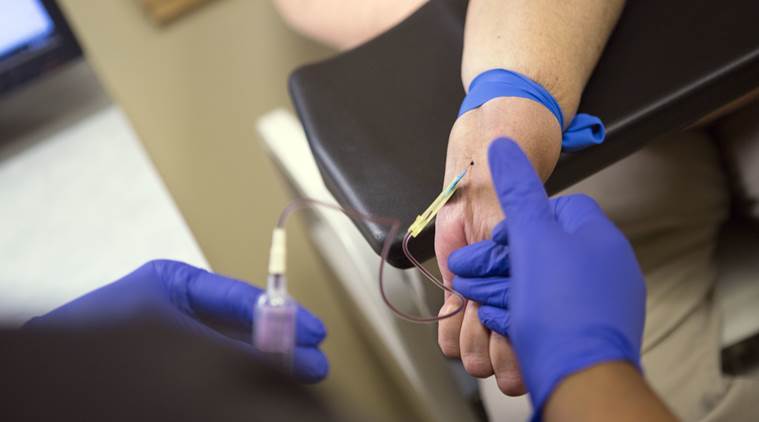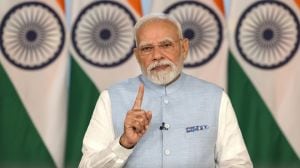Pact inked by Mylan allows new Hepatitis C drug to be made in India, but no sales in local market
The World Health Organisation included it in its (WHO) model list of essential medicines last year as a recommended Hep C treatment.
 The drug, a combination of glecaprevir and pibrentasvir, was developed by AbbVie. (File Photo)
The drug, a combination of glecaprevir and pibrentasvir, was developed by AbbVie. (File Photo)
Drugmaker Mylan Laboratories in India recently signed an agreement to develop, manufacture and supply the first generic version of a crucial drug for Hepatitis C patients, especially those who don’t respond to existing treatment. The catch, however, is that the drug can be manufactured in India, but patients in the country will not get access to it.
Some health activists feel the development could set a potentially dangerous precedent for other companies to use India as a manufacturing and export hub for medicines, while excluding patients here from the benefits. The drug in question, a combination of glecaprevir and pibrentasvir (G/P), was developed by US biopharma company AbbVie and is sold in America under the brand name Mavyret.
The World Health Organisation included it in its (WHO) model list of essential medicines last year as a recommended Hep C treatment.
According to the sub-licence signed by Mylan with United Nations-backed public health organisation Medicines Patent Pool (MPP), India is listed as a “manufacturing-only” country, and is the only country to be listed in this category. India also does not figure in the 96 countries listed under the category ‘Territory’, which are eligible to access the drug.
Pursuant to MPP’s own licence with AbbVie, Mylan has been granted a “non-exclusive, non-transferable license under the AbbVie Patents to manufacture and develop the licensed compounds and licensed products in the manufacturing-only countries solely for the purpose of commercialization of licensed products in the field and in the territory”. Nearly half of Mylan’s global manufacturing capacity is in India, and it employs around 15,000 people here.
Queries sent to Mylan, AbbVie and MPP about the development remained unanswered by press time on Sunday. Excluding India from the list of eligible territories could leave thousands of patients in need of salvage treatment in the lurch, as patients in various parts of the country have stopped responding to regular Hep C treatment.
“Failure rate of existing therapies in cirrhotic patients is around 10 per cent, while patients without liver damage have better success, so their failure rate is around 4 per cent,” said Dr Praveen Malhotra, head—gastroenterology, Post Graduate Institute of Medical Sciences (PGIMS), Rohtak.
“It may be sounding a little less but, with the prevalence of Hep C coming out across certain belts in the country, the number is actually more. For instance, around five per cent of the population of Haryana would have Hep C, according to our estimates,” he told The Indian Express.
“This is an extremely flawed and unethical licence. You are using India as a manufacturing country in order to produce these drugs and you’re not even giving them to Indian patients,” said Leena Menghaney of the Médecins sans Frontières (MSF) Access Campaign. The body, in the past, attempted to procure the drug for compassionate use in India but was denied permission by AbbVie, she said.
“The model … being built for India is that you can do business with Indian companies and have these agreements, where you can get these drugs manufactured here, but you leave the very people living here out of it. In this case, it’s one treatment, but if this model is allowed to be replicated by the MPP in other therapeutic areas, it can completely undermine access for Indian patients in the future,” she added. This would need to be challenged by the Indian government “more vigorously”, Menghaney said.
Hep C is more prevalent in states like Haryana, Punjab, Uttarakhand, and the North East as well as certain parts of Maharashtra and Andhra Pradesh. PGIMS Rohtak has treated around 25,000 patients as part of a dedicated screening programme since 2013, making the number of patients estimated to have failed such treatment around 1,450 in Haryana alone.
Malhotra also expects a rising number of patients developing resistance to first- and second-line treatment. “There is a good chunk of patients across the country who would require this drug (Mavyret generic),” he said.
From 2011 to 2018, AbbVie also submitted five patent applications related to the drug in India. However, one of the applications was opposed in June 2019 by the Delhi Network of Positive People and Initiative for Medicines, Access and Knowledge, Inc, claiming it was “unmerited”.
These patent applications, if granted, would allow AbbVie to drag to court any company wanting to make a generic G/P in India without a similar licence to Mylan’s as well as those making it for the Indian population, said a pharmaceutical lawyer.
Photos





- 01
- 02
- 03
- 04
- 05

























